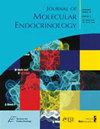C-peptide attenuates hyperglycemia-induced pulmonary fibrosis by inhibiting transglutaminase 2.
IF 3.8
4区 医学
Q2 ENDOCRINOLOGY & METABOLISM
引用次数: 5
Abstract
Proinsulin C-peptide has a protective effect against diabetic complications; however, its role in hyperglycemia-induced pulmonary fibrosis is unknown. In this study, we investigated the inhibitory effect of C-peptide on hyperglycemia-induced pulmonary fibrosis and the molecular mechanism of C-peptide action in the lungs of diabetic mice and in human pulmonary microvascular endothelial cells (HPMVECs). We found that, in the lungs of diabetic mice, C-peptide supplementation using osmotic pumps attenuated hyperglycemia-induced pulmonary fibrosis and expression of fibrosis-related proteins. In HPMVECs, C-peptide inhibited vascular endothelial growth factor-induced adherens junction disruption and endothelial cell permeability by inhibiting reactive oxygen species generation and transglutaminase (TGase) activation. In the lungs, C-peptide supplementation suppressed hyperglycemia-induced ROS generation, TGase activation, and microvascular leakage. C-peptide inhibited hyperglycemia-induced inflammation and apoptosis, which are involved in the pathological process of pulmonary fibrosis. We also demonstrated the role of TGase2 in hyperglycemia-induced vascular leakage, inflammation, apoptosis, and pulmonary fibrosis in the lungs of diabetic TGase2-null (Tgm2-/-) mice. Furthermore, we demonstrated a long-term inhibitory effect of systemic delivery of C-peptide using K9-C-peptide hydrogels on hyperglycemia-induced fibrosis in diabetic lungs. Overall, our findings suggest that C-peptide alleviates hyperglycemia-induced pulmonary fibrosis by inhibiting TGase2-mediated microvascular leakage, inflammation, and apoptosis in diabetes.C肽通过抑制转谷氨酰胺酶2来减轻高血糖诱导的肺纤维化。
胰岛素原C肽对糖尿病并发症具有保护作用;然而,它在高血糖诱导的肺纤维化中的作用尚不清楚。在本研究中,我们研究了C肽对高血糖诱导的肺纤维化的抑制作用,以及C肽在糖尿病小鼠肺和人肺微血管内皮细胞(HPMVEC)中作用的分子机制。我们发现,在糖尿病小鼠的肺中,使用渗透泵补充C肽可以减轻高血糖诱导的肺纤维化和纤维化相关蛋白的表达。在HPMVEC中,C肽通过抑制活性氧的产生和转谷氨酰胺酶(TGase)的激活,抑制血管内皮生长因子诱导的粘附分子连接破坏和内皮细胞通透性。在肺部,补充C肽可以抑制高血糖诱导的ROS生成、TGase激活和微血管渗漏。C肽可抑制高血糖诱导的炎症和细胞凋亡,而这些炎症和凋亡参与了肺纤维化的病理过程。我们还证明了TGase2在糖尿病TGase2-null(Tgm2-/-)小鼠肺中高血糖诱导的血管渗漏、炎症、细胞凋亡和肺纤维化中的作用。此外,我们证明了使用K9-C-肽水凝胶全身递送C肽对高血糖诱导的糖尿病肺纤维化的长期抑制作用。总之,我们的研究结果表明,C肽通过抑制糖尿病患者TGase2介导的微血管渗漏、炎症和细胞凋亡来减轻高血糖诱导的肺纤维化。
本文章由计算机程序翻译,如有差异,请以英文原文为准。
求助全文
约1分钟内获得全文
求助全文
来源期刊

Journal of molecular endocrinology
医学-内分泌学与代谢
CiteScore
6.90
自引率
0.00%
发文量
96
审稿时长
1 months
期刊介绍:
The Journal of Molecular Endocrinology is an official journal of the Society for Endocrinology and is endorsed by the European Society of Endocrinology and the Endocrine Society of Australia.
Journal of Molecular Endocrinology is a leading global journal that publishes original research articles and reviews. The journal focuses on molecular and cellular mechanisms in endocrinology, including: gene regulation, cell biology, signalling, mutations, transgenics, hormone-dependant cancers, nuclear receptors, and omics. Basic and pathophysiological studies at the molecule and cell level are considered, as well as human sample studies where this is the experimental model of choice. Technique studies including CRISPR or gene editing are also encouraged.
 求助内容:
求助内容: 应助结果提醒方式:
应助结果提醒方式:


